STANLEY KUBRICK'S BARRY LYNDON
Shot-by-Shot Analysis
Part Two

Go to TOC for this film ( (which has also a statement on purpose and manner of analysis and a disclaimer as to caveat emptor and my knowing anything authoritatively, which I do not, but I do try to not know earnestly, with some discretion, and considerable thought).
TOC and Supplemental Posts | Part 1 | Part 2 | Part 3 | Part 4 | Part 5 | Part 6 | Part 7 | Films Home
LINKS TO SECTIONS OF THE ANALYSIS ON THIS PAGE:
Captain Feeny, Shots 119 through 157
Notes on Captain Feeny. Book versus film. The magic of misdirection. Fathers and sons and this scene as a bridge in which is past and future.
Barry is Recruited, Shots 158 through 163
Notes on Barry is Recruited. Book versus film. Health to the Barley Mow.
The Boxing Match Under the Mountain, Shots 164 through 196
Notes on The Boxing Match Under the Mountain. Book versus film.
How Prior Events are Reconstellated in The Boxing Match, and Their Relevance to the "Health to the Barley Mow" Song.
Grogan and Barry Meet Again, Shots 197 through 216
Notes on Grogan and Barry Meet Again. Book versus film. The magic of misdirection.
The Death of Grogan, Shots 217 through 248
Notes on The Death of Grogan. Book versus film. The kiss.
Barry Becomes a Lieutenant, Shots 249 through 254
Notes on Barry Becomes a Lieutenant. Book versus film. How this scene is similar to HAL and the chess game.
119 LS Barry rides toward the camera. The music continues. The Sea-Maiden. (28:19)
NARRATION: No lad with liberty for the first time, and 20 guineas in his pocket, is very sad. And Barry rode towards Dublin, thinking not so much of the kind mother...

120 LS Barry riding toward the camera, toward a small tavern. (28:30)
NARRATION: ...left alone, and the home behind him, but of tomorrow and all the wonders it would bring.
BARRY (reaching the pub, speaking to a serving woman): Excuse me, miss.
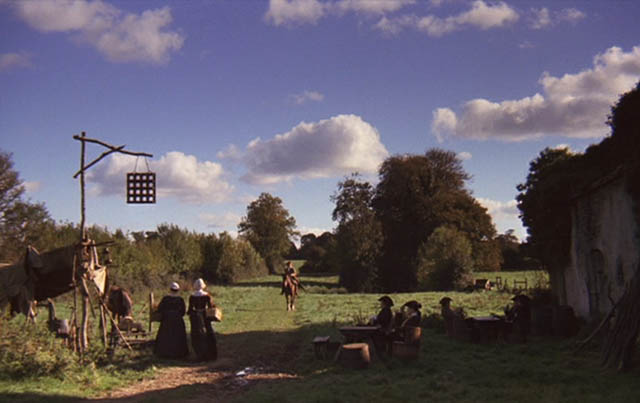
121 MLS of Barry astride his horse speaking to the server. (28:51)
BARRY: Would it be possible to have a drink of water?
SERVER: Yes, sir.
122 MS of two men at a table outside the pub. (28:56)
CAPTAIN FEENY: Good day to you, young sir.
123 MS of Barry on his horse. (29:01)
BARRY: Good day.
124 The two men at the table. (29:06)
CAPTAIN FEENY: Will you join us in a drink?
125 Barry on his horse. (29:13)
BARRY: No, thank you.
126 The two men. (29:17)
CAPTAIN FEENY: Would you like something to eat?
127 Barry on his horse. (29:22)
BARRY: That's very kind of you, but I have to be on my way.
128 Return to shot 121 of Barry and the two men at the table. (29:27)
The server brings Barry his water and he pays her and takes the tumbler and drinks.
BARRY: Thank you.
129 The two men at the table watching. (29:37)
130 Return to shot 127 of Barry on his horse. He returns the tumbler to the woman. (29:42)
131 CU of Captain Feeny. (29:45)
CAPTAIN FEENY: Goodbye.
132 Return to LS 120. Barry rides away, toward the camera and exits left. (29:47)
The harmonica music ends. Drums begin.
 121 |
 122 |
 123 |
 124 |
 125 |
 126 |
 127 |
 128 |
 129 |
 130 |
 131 |
 132 |
133 Barry on another road, riding towards the camera. Begin the Sean O'Riada Tin Whistles. (29:59)
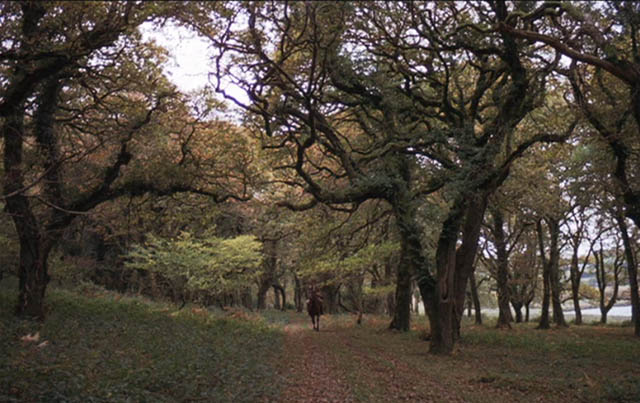
134 CU of Barry seeming to notice something on the road. (30:10)
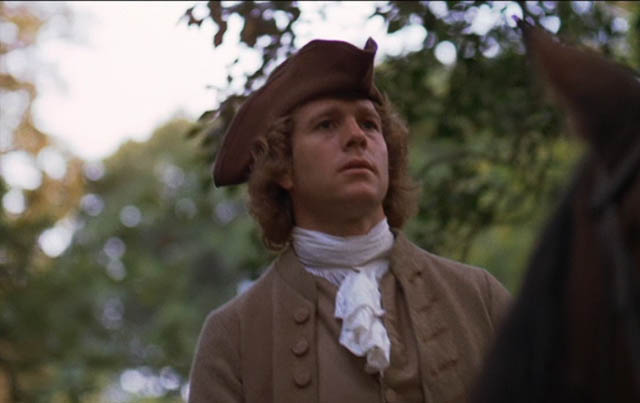
135 LS of a man in dark clothing on the road before a felled tree, from behind Barry. (30:18)
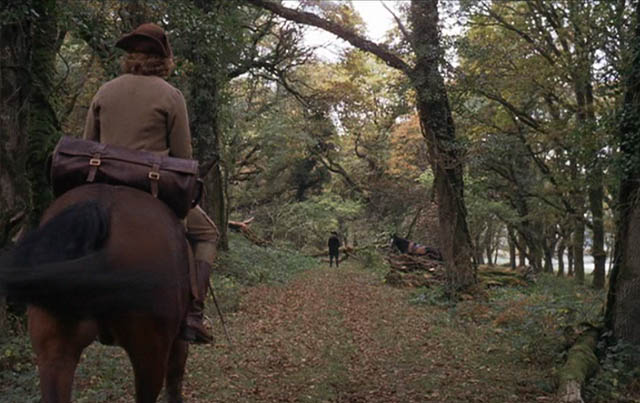
136 MS of Barry, riding forward, perplexed. (30:25)
137 Back to LS of the man in the road, his back to Barry, Barry riding closer. (30:32)
BARRY: Uh, excuse me, sir.
The man turns and faces him with pistols drawn.
CAPTAIN FEENY: Good morning again, young sir.
138 LS of Barry on his horse, from beyond Feeny. Barry glances behind him, perplexed. (30:52)
Feeny's son rides up behind Barry from in the woods. Barry looks briefly as he might try to ride away.
CAPTAIN FEENY: Don't even think about it.
139 MS of Capt. Feeny. (31:01)
CAPTAIN FEENY: Get down off that horse.
140 Return to LS of Barry on his horse. (31:06)
Barry dismounts, as does Feeny's son.
CAPTAIN FEENY: Raise your hands above your head, please. Come forward.
Stop.
Barry does all that is demanded of him.
141 MS of Capt. Feeny facing the camera. (31:29)
CAPTAIN FEENY: How do you do. I'm Captain Feeney.
142 MS of Barry, Feeny's son beyond. (31:34)
BARRY: Captain Feeny!
CAPTAIN FEENY: Captain Feeney, at your service.
BARRY: The Captain Feeney?
143 MS of Capt. Feeny. (31:43)
CAPTAIN FEENY: None other. May I introduce you to my son...Seamus?
144 Return to MS of Barry and Seamus. (31:47)
SEAMUS: How do you do.
BARRY: How do you do.
CAPTAIN FEENY: To whom have I The honour of speaking?
BARRY (perking up proudly): My name's Redmond Barry.
CAPTAIN FEENY: How do you do, Mr. Barry?
145 Return to MS of Feeny. (32:03 or thereabouts)
CAPTAIN FEENY: And now I'm afraid we must get onto the more
regrettable stage of our brief acquaintance. Turn around, and keep your hands high above your head, please.
146 Return to MS of Barry. (32:11)
Barry does as told.
147 MCU of Barry 3/4 from the side and Seamus frisking him. (32:19)
First, Seamus removes his hat. Checks his boots, legs, coat pockets and takes something from one of them, a little bag.
148 MS of Barry from behind and right of Seamus, Feeny beyond. (32:33)
Seamus continues frisking him. He finds a larger bag in his vest pocket.
149 MS of Seamus from behind left of Barry as he empties the contents of the bag in is hand. (32:42)
SEAMUS (astonished): There must be 20 guineas in gold here, Father.
CAPTAIN FEENY: Well...
150 MS of Feeny. (32:48)
CAPTAIN FEENY: Well, well, well, you seem to be a very well set up
young gentleman, sir.
151 MS of Barry from behind. (32:53)
BARRY: Captain Feeney, that's all the money my mother had in the world. Mightn't I allowed to keep it? I'm just one step ahead of the Law myself. I killed an English Officer in a duel, and I'm on my way to Dublin until things cool down.
CAPTAIN FEENY: Mr. Barry...
152 MS of Barry from behind left of Seamus, Feeny beyond. (33:09)
CAPTAIN FEENY: ...in my profession we hear many such stories. Yours is the most intriguing and touching I've heard in many weeks. Nevertheless, I'm afraid I cannot grant your request. But, I'll tell you what I will do. I'll allow...
153 MS of Barry from beyond and behind Feeny's left. (33:25)
CAPTAIN SEAMUS: ...you to keep those fine pair of boots, which in normal circumstances I would have for myself. The next town is only five miles away, and I suggest you now start walking.
BARRY: Mightn't I be allowed to keep my horse?
154 MCU of Feeny. (33:37)
CAPTAIN FEENY: I should like to oblige you, but with people like us we must be able to travel faster than our clients.
155 MS of Barry. (33:43)
CAPTAIN FEENY: Good day, young sir.
Seamus steps aside and allows Barry to pass him and continue down the road.
156 LS of Barry from behind and left of Saemus, Barry moving to the left to walk around the felled tree. (33:54)
CAPTAIN FEENY: You can put down your hands now, Mr. Barry.
 136 |
 137 |
 138 |
 139 |
 140 |
 141 |
 142 |
 143 |
 144 |
 145 |
 146 |
 147 |
 148 |
 149 |
 150 |
 151 |
 152 |
 153 |
 154 |
 155 |
 156 |
|
157 LS of Barry now walking down the road rather than riding. (34:10)
Three who-whee bird tweets as the shot ends.
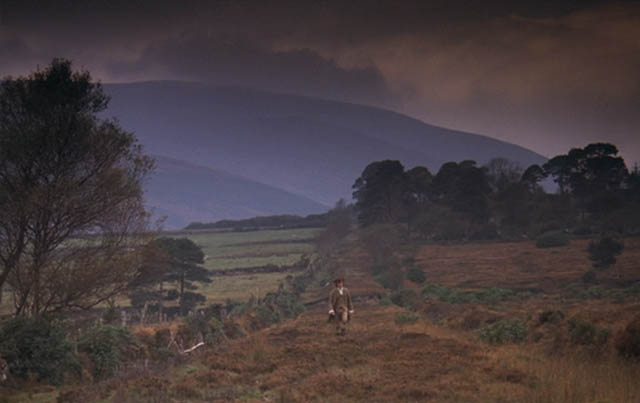
Those clouds in shots 119 and 157 are amazing, Barry approaching the camera as he leaves home and then as he continues on his way empty-handed following his encounter with Feeny.
And here the movie and the book depart greatly, while again the early screenplay is faithful to the book.
In the book, as Barry leaves his mother's home, Chapter II ends on what really begins a new chapter in the film.
...no lad of sixteen is VERY sad who has liberty for the first time, and twenty guineas in his pocket: and I rode away, thinking, I confess, not so much of the kind mother left alone, and of the home behind me, as of to-morrow, and all the wonders it would bring.
Barry rides that night to Carlow, then travels part of the way to Naas with a "well-armed gentleman from Kilkenny, dressed in green and a gold cord, with a patch on his eye, and riding a powerful mare. He asked me the question of the day, and whither I was bound, and whether my mother was not afraid on account of the highwaymen to let one so young as myself to travel? But I said, pulling out one of them from a holster, that I had a pair of good pistols that had already done execution, and were ready to do it again; and here, a pock-marked man coming up, he put spurs into his bay mare and left me."
A little later Barry comes upon people yelling "Stop thief" while the fellow in green is hurriedly riding away. The story is that a woman, the wife of a Captain Fitzsimmons, had been robbed by Captain Freny, who becomes Captain Feeny in the movie. Keeping it short and simple, Barry presenting himself as wealthy and high born in this part of his travels, comes to Ms. Fitzsimmons aid. He is invited by her to stay at her home. In Dublin, Barry is taken on quite a ride by these thieves, the Fitzsimmons being both imposters, and he spends his money liberally, even falling into debt.
Barry is given an opportunity at the beginning of this misadventure to see the truth of Mrs. Fitzsimmons' con.
'Indeed, madam,' said I, 'I have preserved nothing for you.' Which was perfectly true; for had I not come up too late after the robbery to prevent the highwayman from carrying off her money and pearls?
'And sure, ma'am, them wasn't much,' said Sullivan, the blundering servant, who had been so frightened at Freny's approach, and was waiting on us at dinner. 'Didn't he return you the thirteenpence in copper, and the watch, saying it was only pinch-beck?'
But his lady rebuked him for a saucy varlet, and turned him out of the room at once, saying to me when he had gone, 'that the fool didn't know what was the meaning of a hundred-pound bill, which was in the pocket-book that Freny took from her.'
The servant had pointed out how Ms. Fitzsimmons was carrying nothing of any value but Barry rejects this remark and instead favors Ms. Fitzsimmons' insistence that the servant was only a fool.
Instead, in the film, Freny becomes Feeny and is the one, in company with his son, who deprives Barry of his money and horse, which might have happened on the road had Barry's meeting with Freny not been interrupted by the pock-marked man. This frees up the film from what may have turned into a tiresome interlude. What the Dublin scenes provide in the book is the pitiful tension of a naive imposter (Barry) against accomplished imposters, showing us both Barry's innocence but also how he is learning the rough ways of the world through both his inexperience and his insistence on presenting himself in a false light. The film's scene accomplishes much the same but doesn't have Barry lying yet about his status.
What occurred to me, watching the scene of the robbery in the movie, was its relationship to magic. Much as in shot 25, in shot 135 we have our attention directed to the man in dark clothing standing center frame. In shot 25, that man is not Barry--Barry instead stands off to the side unnoticed. Here, Barry should have immediately sensed his peril (which might have done him no good) but he rides on toward the sinister figure whose peculiar presence in the road supposedly also has distracted Barry from noticing the presence of Feeny's son nearby, off the road, waiting to cut Barry off at the rear so he might not escape. Same as in magic, the importance of the diversion.
As it turns out, the actor playing Captain Feeny, Arthur O'Sullivan, played Mr. McCardle in Ryan's Daughter, and his wife, Mrs. McCardle, was played by Marie Kean, who also portrays Barry's mother. Kubrick has chosen to be Barry's mother a woman who was, in another film, the wife of the thief who divests Barry of his money, which pushes Barry toward his seeming fate of going into the military.
No, Feeny is not thus intended to represent Barry's father. But fathers and sons and father figures and their relationships are a constant theme in the film. So, too, is doubling a constant Kubrick theme and Feeny does in a strange way end up doubling as a father figure, even performing the robbery with a son.
We've the feeling that if Barry's father had lived, Barry would not be so naive, he would be a little more prepared for his journey.
The name Feeney is said to come from O Fiannaidhe, meaning "soldier". So, we have Barry abused by two "soldiers" before he even steps foot in the military, foreshadowing his dismal experience as a soldier.
As noted earlier, Kubrick has, in his early screen play, Barry named Roderick James. There is given in the book no son of Freny (Feeny in the film) but he appears in the film as Seamus. Seamus is the Gaelic equivalent of James/Jacob. This name may also play into Kubrick's doublings through the twinship of Jacob and Esau.
Just as the name of Feeny leads us into Barry's next adventure with the military, so does this scene refer to the past with this fatherly ghost robbing Barry. Perhaps one could think of Barry as having been robbed by his father's bad habits that led to the duel that killed him.
158 CU of a tavern sign, "Health to the Barley Mow", which shows a man dancing at the height of a ladder atop a stack of grain, several women and men dancing at its base. (34:21)
Drums. The camera zooms out to show a red-coat recruiter standing atop a bench beneath the sign, townspeople gathered about to listen, and Barry as well.
RECRUITER: Gale's Regiment of Foot, commanded
by Lieutenant General Charles Gale, which has so gloriously distinguished itself during the recent troubles...
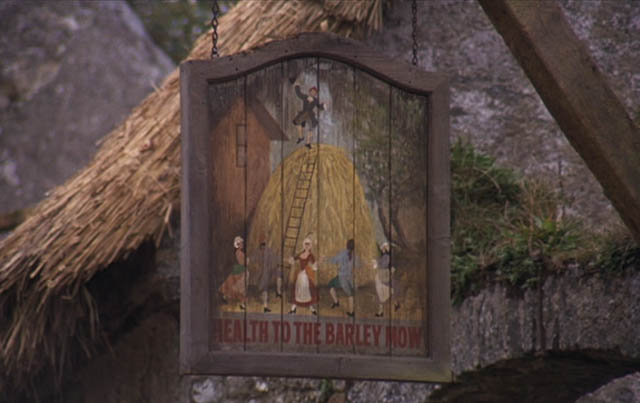
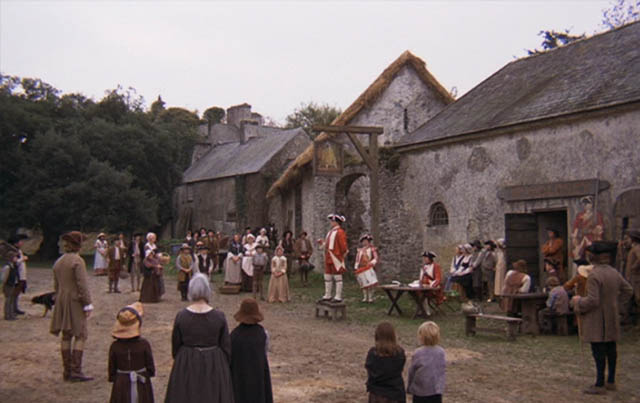
159 MS of the recruiter and drummer from the side. (34:46)
RECRUITER: ...wants several men to supply the places of those veterans who have deserved to be pensioned as gentlemen at one shilling a day for the rest of their lives.
160 LS of BARRY from behind the recruiter. He listens with interest.
RECRUITER: All clever young fellows who are free and able, and are ambitious of becoming gentlemen by bearing arms, are hereby invited to...
161 LS of recruiter from the side. (35:08)
RECRUITER: ...step up and meet the Recruiting Officer, who promises that they shall meet with every encouragement that merit and good behaviour can entitle them to.
162 CU of Barry. (35:19)
RECRUITER: Those meeting the qualifications will immediately receive His Majesty's Royal Bounty of one and a half guineas...
163 MS of recruiter and drummer from the side. (35:28)
RECRUITER: ...with complete clothing, arms and accoutrements. King George and Old England forever.
The recruiter completes his spiel and everyone applauds.
 159 |
 160 |
 161 |
 162 |
 163 |
|
The book, as with the original screenplay, makes shorter order of this scene.
I gave one of my shillings to Sullivan the butler of the Fitzsimonses, and, running into the street, hastened to the little alehouse at which my acquaintance was quartered, and before ten minutes had accepted His Majesty's shilling. I told him frankly that I was a young gentleman in difficulties; that I had killed an officer in a duel, and was anxious to get out of the country. But I need not have troubled myself with any explanations; King George was too much in want of men then to heed from whence they came, and a fellow of my inches, the sergeant said, was always welcome. Indeed, I could not, he said, have chosen my time better. A transport was lying at Dunleary, waiting for a wind, and on board that ship, to which I marched that night, I made some surprising discoveries, which shall be told in the next chapter.
Feeny, etymologically a "soldier", was first met by Barry in front of a tavern, and Kubrick returns us to a tavern setting, as in the book, for the recruitment.
"Health to the Barley Mow" is, from what I gather, a beer drinking song. I guess the idea is it's done after the harvesting of the barley, the last sheaf, known as the crow or craw sheaf, brought in. I don't know why it's called the "crow sheaf" and wonder if it has to do with that sheaf being the equivalent of the gleanings or what comes before the gleanings, the remains being for gleaners and gleaning animals like crows.
Why the prominence of the sign? We shall see in the next section the why of the prominecne of this sign.
164 MS of Barry now in the army, marching screen right to left with others. (35:42)
NARRATION: For a young gentleman in difficulty, who had killed a man in a duel and was anxious to find refuge from the Law, the opportunity to earn distinction in the European wars, seemed a great stroke of good fortune.
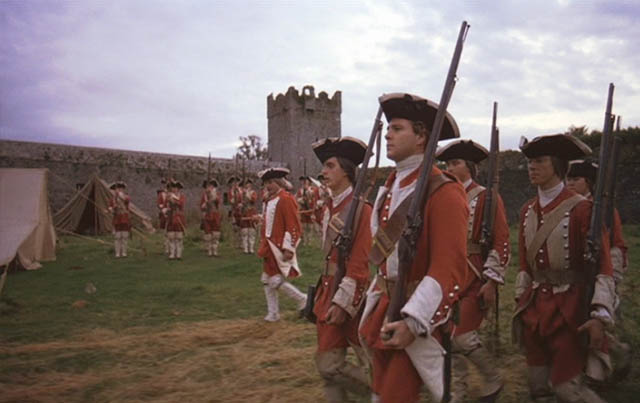
165 MS of Barry seated, eating, with a number of other recruits, a pyramid shaped hill in the distance. (36:07)
NARRATION: And King George was too much in want of men, to heed from whence they came.
A young man goes around handing out beakers, giving one to Barry. He's followed by another who carries a barrel of water that he dispenses into the beakers.
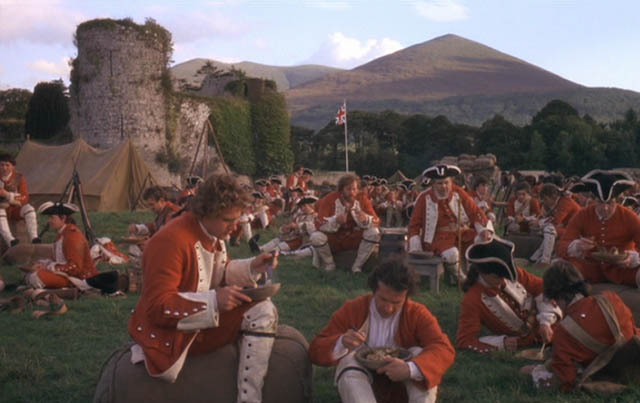
166 MS of Barry from the other side, water being poured into his beaker. (36:25)
BARRY: Hey, lad, lad, lad!
167 Return to shot 165. (36:34)
BARRY: Can I have a new beaker? This one is full of grease.
Everyone laughs at him.
168 CU of Barry. (36:41)
169 Return to shot 167. (36:45)
TOOLE: Covered in grease! Give the gentleman a towel and a basin of turtle soup.
The individual who has spoken, Toole, a large red-haired man with a beard, advances and takes Barry's beaker.
170 MS of Toole and Barry from the side. (37:07)
Toole drinks Barry's water and tosses his cup down.
171 Return to shot 169. (37:22)
MAN SEATED BEFORE BARRY: If you want to vex him, ask him about his wife, the washerwoman who beats him.
BARRY: Mr. Toole, is it a towel of your wife's washing? They say she wipes your face
often with one.
MAN SEATED BEFORE BARRY: Ask him why he wouldn't see her yesterday when she came to the camp.
BARRY: Mr. Toole, why did you hide so yesterday when Mrs. Toole came to visit you? Afraid of getting your ears boxed?
All laugh. Toole, humiliated, rises and threateningly advances. He picks up a bench with a bowl atop it, the bowl flying off and breaking in two.
An officer steps forward.
OFFICER: Gentlemen, gentlemen, you may fight it out with fists if you choose.
 166 |
 167 |
 168 |
 169 |
 170 |
 171 |

172 MS of Toole. (37:58)
OFFICER: We will form a square for that purpose.
The bench Toole holds in this shot still has the round bowl atop it. He flings the bench and bowl aside now. The bowl is obviously glued or nailed to the bench as it stays fixed to it when he throws the bench, the bowl not falling off.

173 LS of Square formed of men with Barry and Toole at opposing corners. (38:11)
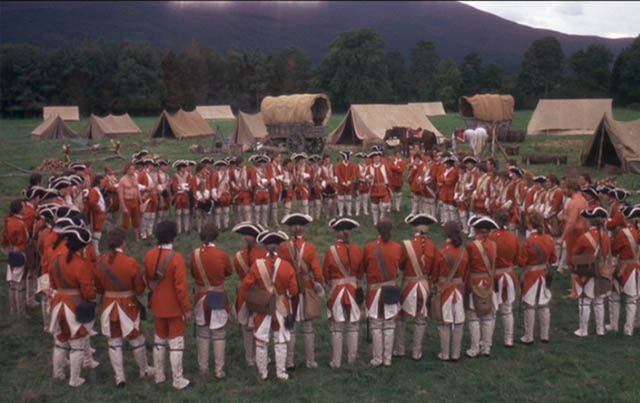
REFEREE: Gentlemen, step this way, please.
Barry and Toole step into the center of the "ring".
174 MS of referee with Toole beyond. (38:23)
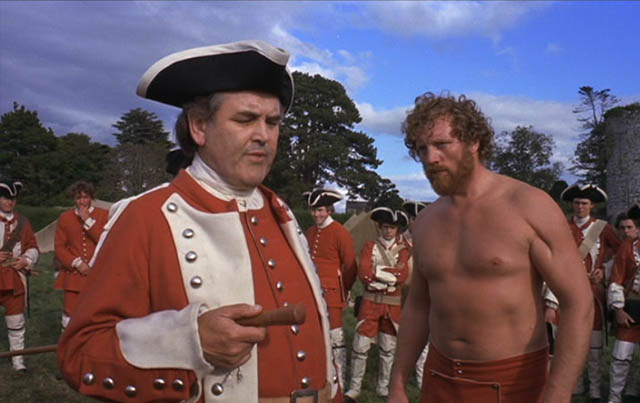
REFEREE: Shake hands. Shake hands. Take your stance.
No biting, kicking or scratching. The last man to remain standing is the winner. Gentlemen, commence fighting, now!
The referee steps out of the way as Barry and Toole prepare to fight, fists raised. Toole takes a swing at Barry and he ducks.
175 MS of Barry and Toole. (38:49)
Toole keeps swinging and Barry keeps dodging.
176 MS of Toole from beyond Barry. (38:55)
Toole continues to swing and miss.
177 MS of Barry from beyond Toole. (38:59)
Toole keeps swinging, falls into the ring of men and is pushed back into the fight.
178 MS of Toole from beyond Barry. (39:12)
179 Another MS just as Barry connects with Toole's nose and he falls. (39:14 about)
180 Low MS from behind Toole as he rises. (39:18)
181 MS of an angry Toole. (39:23)
182 MS Barry from beyond Toole. (39:31)
Barry connects.
183 MS Toole falling as Barry connects again. (39:35)
184 The men picking up Toole and pushing him back into the ring. (39:41)
185 Barry from beyond Toole. (39:53)
Barry connects twice more.
186 Toole falls. (39:56)
187 MS Barry. (39:58)
188 MS of the men pushing Toole back into the fight. (39:59)
189 MS Barry. (40:06)
190 MS Toole. (40:08)
Barry hits him twice.
191 MS Toole on the ground, stunned. (40:11)
192 MS Barry. (40:14 about)
193 CU Barry's back and then Toole on the ground beyond. (40:15)
Toole struggles to stand. Barry connects again. Again. Toole again begins to stand.
194 MS Barry. (40:37)
195 MCU Toole standing. (40:38)
Barry hits him again and Toole goes down.
196 MS Barry, the men behind him celebrating his win. (40:52)
They lift up the triumphant Barry on their shoulders.
 175 |
 176 |
 177 |
 178 |
 179 |
 180 |
 181 |
 182 |
 183 |
 184 |
 185 |
 186 |
 187 |
 188 |
 189 |
 190 |
 191 |
 192 |
 193 |
 194 |
 195 |
 196 |
Below is how Thackery portrays the fight with Toole and is much the same as in the film.
The first of these consolations I had was a good quarrel, which took place on the day after my entrance into the transport-ship, with a huge red-haired monster of a fellow—a chairman, who had enlisted to fly from a vixen of a wife, who, boxer as he was, had been more than a match for him. As soon as this fellow—Toole, I remember, was his name—got away from the arms of the washerwoman his lady, his natural courage and ferocity returned, and he became the tyrant of all round about him. All recruits, especially, were the object of the brute's insult and ill-treatment.
I had no money, as I said, and was sitting very disconsolately over a platter of rancid bacon and mouldy biscuit, which was served to us at mess, when it came to my turn to be helped to drink, and I was served, like the rest, with a dirty tin noggin, containing somewhat more than half a pint of rum-and-water. The beaker was so greasy and filthy that I could not help turning round to the messman and saying, 'Fellow, get me a glass!' At which all the wretches round about me burst into a roar of laughter, the very loudest among them being, of course, Mr. Toole. 'Get the gentleman a towel for his hands, and serve him a basin of turtle-soup,' roared the monster, who was sitting, or rather squatting, on the deck opposite me; and as he spoke he suddenly seized my beaker of grog and emptied it, in the midst of another burst of applause.
'If you want to vex him, ax him about his wife the washerwoman, who BATES him,' here whispered in my ear another worthy, a retired link-boy, who, disgusted with his profession, had adopted the military life.
'Is it a towel of your wife's washing, Mr. Toole?' said I. 'I'm told she wiped your face often with one.'
'Ax him why he wouldn't see her yesterday, when she came to the ship,' continued the link-boy. And so I put to him some other foolish jokes about soapsuds, henpecking, and flat-irons, which set the man into a fury, and succeeded in raising a quarrel between us. We should have fallen to at once, but a couple of grinning marines, who kept watch at the door, for fear we should repent of our bargain and have a fancy to escape, came forward and interposed between us with fixed bayonets; but the sergeant coming down the ladder, and hearing the dispute, condescended to say that we might fight it out like men with FISTES if we chose, and that the fore-deck should be free to us for that purpose. But the use of fistes, as the Englishman called them, was not then general in Ireland, and it was agreed that we should have a pair of cudgels; with one of which weapons I finished the fellow in four minutes, giving him a thump across his stupid sconce which laid him lifeless on the deck, and not receiving myself a single hurt of consequence.
But there is more of course going on here as Kubrick has a history with boxing all the way back to Day of the Fight, and has connected boxing with dance all the way back in Killer's Kiss.
Shot 43 of Kubrick's production of "Day of the Fight",
the boxer prepares for his fight with his hands being wrapped.
Below are shots 27 through 82 from Killer's Kiss. At the dance hall where Gloria works a fight interrupts a dance even as Davey is in the boxing ring about to fight.
Shot 77 | Shot 78 |
 |  |
Shot 79 | Shot 80 |
 |  |
Shot 81 | Shot 82 |
 |  |
Fighting is presented as a dance in A Clockwork Orange, first with Billy Boy and his gang battling Alex and his droogs, and then with the Cat Woman who wields the bust of Beethoven while Alex holds the Rocking Chair phallus sculpture.
Presiding large over the boxing scene with O'Toole is a pyramid of a hill. The pyramid that everyone pays attention to in Kubrick's work is the prison one in A Clockwork Orange, the prisoners walking their daily grind of circularity below.
But there are many less obvious pyramids/triangles in Kubrick's work, including this yoga triangle pose of the "cat woman" before her battle with Alex.
And this pyramid formed of the corner in which the bloodied Alex rests in jail.
The hill pyramid first occurs in Barry Lyndon accompanying the regimental display where a dance also takes place, battle and dancing once again displayed in a parallel fashion, as in Killer's Kiss.
That first hill pyramid and the regimental display is related to the fight that occurs here under another hill pyramid.

Some would probably say that this has all to do with single point perspective that Kubrick often utilizes, and it does have to do with this (single point perspective in this film is strong in this section with the long shots of Barry journeying down a straight path), but there is more to it than framing.
So, I would ask you to pay attention to a couple of things. One, remember Kubrick's affection for doubles, they always occur in his films, even if obscured, and Day of the Fight concerned boxing twins. What do we see in the below screengrab?
We see, standing behind Alex, a man who doesn't exactly look like him, but there's a kind of doubling effect. This is actually a man who threw him a kiss earlier in the movie when the preacher was giving a sermon.
I would hazard that Kubrick is going for the same kind of doubling here with the red-haired monster of a man who fights Barry. This returns us to Day of the Fight about twin boxers, in which Vincent is so psychically identified with Walter he will himself feel he is taking any blows that land on Walter, but he also spars with Walter and is a mirror image of him.


What must happen now is that we pay attention to not only the doubling, but the idea of the endless circularity of the prison marchers (Kubrick's depictions of our endless circularities in time and experience, of anamnesis). And to do that here, we need to go back to that "Health of the Barley Mow" song in the previous scene. That song is called a cumulative song, and what that means is it goes in cycles and as it goes in cycles it builds. Like "The Twelve Days of Christmas", with each repetition of a verse, a new portion is added on so the song accumulates and becomes longer and longer, retaining in it all the old verses.
Here's one version of the Barley Mow song.
Here's a health to the barley-mow, my brave boys,
Here's a health to the barley-mow!
We'll drink it out of the jolly brown bowl,
Here's a health to the barley-mow!
By the end we have this.
We'll drink it out of the ocean, my boys,
Here's a health to the barley-mow!
The ocean, the river, the well, the pipe, the hogshead,
The half-hogshead, the anker, the half-anker,
The gallon, the pottle, the quart, the pint,
The half-a-pint, the quarter-pint, the nipperkin,
And the jolly brown bowl!
The root is the jolly brown bowl to which the song always returns. The circle. What is happening in shot 172? I have pointed out earlier that in shot 171 we see that bowl on Toole's bench go flying off when he picks up the bench and that bowl shatters in two, right down the middle, when it strikes the ground. But in shot 172 the bowl is back and it's glued or nailed to that bench so it doesn't budge when Toole picks up the bench and it stays stuck to it when the bench is thrown down. Our attention is being purposefully drawn to that bowl. It's the jolly brown bowl of the Health to the Barley Mow song and we have in it that circularity of Kubrick's, the repetitions, anamnesis. It will probably be said that the bowl flew off and broke and Kubrick didn't want this happening with each retake and breaking all the bowls so the bowl was then fixed to the bench. And, no, one doesn't want dozens of broken bowls. But, still, I believe that this bowl is the jolly brown bowl of the Barley Mow song and is part of Kubrick's circularities.
In A Clockwork Orange, we had the big man who pursed his lips in a kiss at Alex while the preacher was giving his sermon. That prison chaplain was Godfrey Quigley, and his argument for Alex was always to allow him free will, to not lock him in the mechanics of fate, which he saw the Ludovico experiment as being as it left a person without free will. Quigly is the same man who plays Captain Grogan in this film, who was a second at the duel with Quin, and it's after this fight with Toole that he returns, and he dies, and he states the breaking of a certain cycle with his statement, "We'll not meet again."
But Lolita had said the same after rushing up the stairs to kiss Humbert before heading off to camp. "Well, I guess I won't be seeing you again, huh."
197 LS of soldiers marching to fife music and drums. The camera zooms out. (41:06)
NARRATION: Barry's training continued at Dunleary Camp, and within a month he was transformed into a tall and proper young soldier.
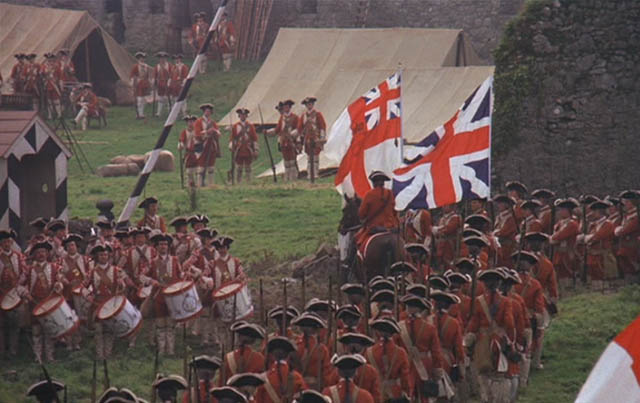
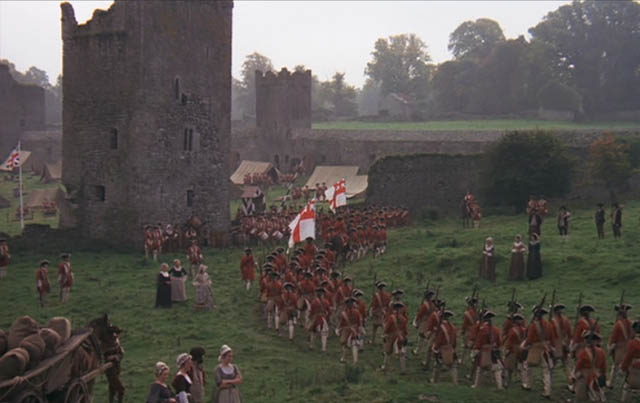
198 MS of Barry standing at attention as other soldiers march past. (41:40)
Begin Lilliburlero Fifes and Drums music.
NARRATION: During this time, the Regiment's strength was steadily increased...
199 LS from behind of soldiers marching past drummers. (41:47)
NARRATION: ...by the arrival of other troops, in preparation for joining their gallant armies fighting in Germany.
200 CU of Barry. (41:54)
NARRATION: One of these occasions...
201 MS of Grogan riding on horse, viewed through troops. He rides past and winks at Barry. (41:58)
NARRATION: ...brought the welcome appearance of no other than his second in the fatal duel, Captain Grogan.
202 MS of Barry with Grogan riding past. (42:09)
203 LS of the troops marching into the camp, followed by laughing children. (42:18)
 198 |
 199 |
 200 |
 201 |
 202 |
 203 |
204 MS of Grogan from beyond Barry's left shoulder, in candlelight. (42:24)
CAPTAIN GROGAN: It would have been helpful for all of us if we'd known what had become of you. Didn't you think of writing to your mother?
205 MCU of Barry. (42:33)
BARRY: Of course I did. But the shame I felt of losing all her money, my father's sword and pistols, I couldn't tell her.
206 MS of Gorgan. (42:48)
CAPTAIN GROGAN: Your mother wouldn't care a pin about those things. You are her only concern. Now you must sit down tonight and write her a proper letter and tell her that you're safe and well and married to Brown Bess.
BARRY: I will.
Grogan pours himself a drink.
BARRY: Is Miss Brady well?
CAPTAIN GROGAN: There are only six Miss Bradys now.
207 MCU of Barry. (43:21)
BARRY: Has something happened to Nora?
208 MS of Grogan. (43:26)
CAPTAIN GROGAN: She took on so about your going away, that she was obliged to console herself with a husband. She is now Mrs. John Quin.
209 MCU of Barry. (43:49)
BARRY: Mrs. John Quin? Was there another John Quin?
CAPTAIN GROGAN: No.
210 MS of Grogan. (43:47)
CAPTAIN GROGAN: The very same one, me boy. He recovered from his wound. The shot you hit him with was not likely to hurt him, for it was only made of tow.
211 MCU of Barry. (43:58)
BARRY: Tow?
212 MS of Grogan. (43:59)
CAPTAIN GROGAN: Do you think the Bradys would let you kill 1500 a year out of the family? The plan of the duel was all arranged, to get you out of the way, for the cowardly Quin could never be brought to marry...
213 MCU Barry. (44:15)
CAPTAIN GROGAN: ...from fear of you. But hit him you certainly did, me lad...
214 MS of Grogan. (44:20)
CAPTAIN GROGAN: ...with a fine thick plugget of tow. The fellow was so frightened, that he was an hour in coming to.
215 MCU Barry. (44:26)
216 MS Grogan. (44:27)
CAPTAIN GROGAN: Are you in want of cash? You may draw on me. For I got
a couple of hundred out of your uncle for my share. And while they last, you shall never want.
 204 |
 205 |
 206 |
 207 |
 208 |
 209 |
 210 |
 211 |
 212 |
 213 |
 214 |
 215 |
 216 |
|
Grogan has always a positive, humanizing effect on Barry, a figure that befriends and attempts to talk sense to him, even though Grogan himself proves to be someone who has himself conned Barry.
In the book, Grogan's return coincides with their being on the ship together, and the fight with Toole also occurs on the ship. Instead, Kubrick rearranges the scenes so the passage by ship to Europe follows after the fight and Grogan's return.
This victory over the cock of the vile dunghill obtained me respect among the wretches of whom I formed part, and served to set up my spirits, which otherwise were flagging; and my position was speedily made more bearable by the arrival on board our ship of an old friend. This was no other than my second in the fatal duel which had sent me thus early out into the world, Captain Fagan. There was a young nobleman who had a company in our regiment (Gale's foot), and who, preferring the delights of the Mall and the clubs to the dangers of a rough campaign, had given Fagan the opportunity of an exchange; which, as the latter had no fortune but his sword, he was glad to make. The sergeant was putting us through our exercise on deck (the seamen and officers of the transport looking grinning on) when a boat came from the shore bringing our captain to the ship; and though I started and blushed red as he recognised me—a descendant of the Barrys—in this degrading posture, I promise you that the sight of Fagan's face was most welcome to me, for it assured me that a friend was near me. Before that I was so melancholy that I would certainly have deserted had I found the means, and had not the inevitable marines kept a watch to prevent any such escapes. Fagan gave me a wink of recognition, but offered no public token of acquaintance; it was not until two days afterwards, and when we had bidden adieu to old Ireland and were standing out to sea, that he called me into his cabin, and then, shaking hands with me cordially, gave me news, which I much wanted, of my family. 'I had news of you in Dublin,' he said. ''Faith you've begun early, like your father's son; and I think you could not do better than as you have done. But why did you not write home to your poor mother? She has sent a half-dozen letters to you at Dublin.'
I said I had asked for letters at the post-office, but there were none for Mr. Redmond. I did not like to add that I had been ashamed, after the first week, to write to my mother.
'We must write to her by the pilot,' said he, 'who will leave us in two hours; and you can tell her that you are safe, and married to Brown Bess.' I sighed when he talked about being married; on which he said with a laugh, 'I see you are thinking of a certain young lady at Brady's Town.'
'Is Miss Brady well?' said I; and indeed, could hardly utter it, for I certainly WAS thinking about her: for, though I had forgotten her in the gaieties of Dublin, I have always found adversity makes man very affectionate.
'There's only seven Miss Bradys now,' answered Fagan, in a solemn voice. 'Poor Nora'—
'Good heavens! what of her?' I thought grief had killed her.
'She took on so at your going away that she was obliged to console herself with a husband. She's now Mrs. John Quin.'
'Mrs. John Quin! Was there ANOTHER Mr. John Quin?' asked I, quite wonder-stricken.
'No; the very same one, my boy. He recovered from his wound. The ball you hit him with was not likely to hurt him. It was only made of tow. Do you think the Bradys would let you kill fifteen hundred a year out of the family?' And then Fagan further told me that, in order to get me out of the way—for the cowardly Englishman could never be brought to marry from fear of me—the plan of the duel had been arranged. 'But hit him you certainly did, Redmond, and with a fine thick plugget of tow; and the fellow was so frightened, that he was an hour in coming to. We told your mother the story afterwards, and a pretty scene she made; she despatched a half-score of letters to Dublin after you, but I suppose addressed them to you in your real name, by which you never thought to ask for them.'
'The coward!' said I (though, I confess, my mind was considerably relieved at the thoughts of not having killed him). 'And did the Bradys of Castle Brady consent to admit a poltroon like that into one of the most ancient and honourable families in the world?'
'He has paid off your uncle's mortgage,' said Fagan; 'he gives Nora a coach-and-six; he is to sell out, and Lieutenant Ulick Brady of the Militia is to purchase his company. That coward of a fellow has been the making of your uncle's family. 'Faith! the business was well done.' And then, laughing, he told me how Mick and Ulick had never let him out of their sight, although he was for deserting to England, until the marriage was completed and the happy couple off on their road to Dublin. 'Are you in want of cash, my boy?' continued the good-natured Captain. 'You may draw upon me, for I got a couple of hundred out of Master Quin for my share, and while they last you shall never want.'
And so he bade me sit down and write a letter to my mother, which I did forthwith in very sincere and repentant terms, stating that I had been guilty of extravagances, that I had not known until that moment under what a fatal error I had been labouring, and that I had embarked for Germany as a volunteer. The letter was scarcely finished when the pilot sang out that he was going on shore; and he departed, taking with him, from many an anxious fellow besides myself, our adieux to friends in old Ireland.
Again, the magic of misdirection, and sometime it takes a while to find out the fact of it, if ever. So Barry learns that the duel was fixed and that he'd failed to see it as instead of examining Quin himself he relied on the testimony of others, which was false. The bullet was not real. Had it been real, Quin would have been dead. But it was not real and life went on back home and Quin married Nora. Not only that, but others profited off of it, even his father figure, Grogan, with whom he felt so close.
217 MS of bow of ship and cables cutting through the sea. (44:45)
NARRATION: It would require a great philosopher and historian...
218 Sails of ship. (44:49)
NARRATION: ...to explain the causes of the famous...
Begin British Grenadiers, Fife and Drums music.
219 LS of ship from side. (44:55)
NARRATION: ...Seven Years' War in which Europe was engaged, and in which...
220 LS of ship from front. (45:02)
NARRATION: ... Barry's regiment was now on its way to take part. Take it suffice to say that England and Prussia were allies, and at war against...
 217 |
 218 |
 219 |
 220 |
221 Barry in a troop of soldiers marching with guns drawn. (45:13)
NARRATION: ...the French, the Swedes, the Russians and the Austrians. Barry's first taste of battle was only a skirmish against a small rearguard of Frenchmen...
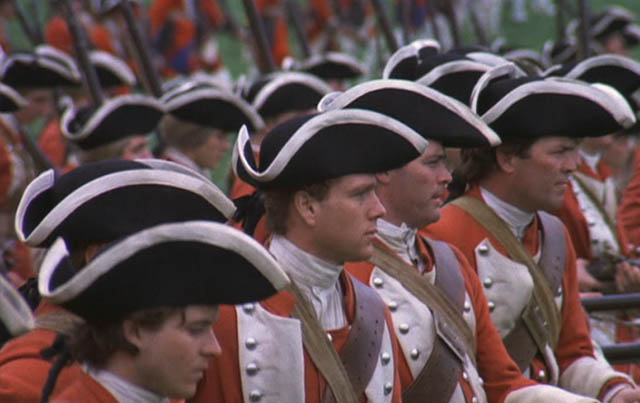
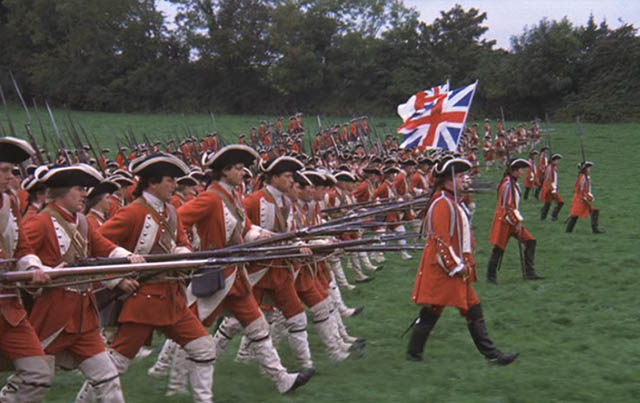
222 MS of rear of Grogan, the Frenchman in the distance. (45:43)
NARRATION: ...who occupied an orchard beside a road down which, a few hours later, the English main force would wish to pass. Though this encounter...
223 Frenchmen from side. (45:53)
NARRATION: ...is not recorded in any history book, it was memorable enough for those who took part.
224 Behind first row of Frenchmen, looking to red coats in the distance. Now just drums. (45:58)
225 French from side. (46:07)
226 Low shot from behind Grogan. (46:12)
227 French from side. (46:18)
228 British from the side. (46:25)
229 From rear of Grogan. (46:33)
 222 |
 223 |
 224 |
 225 |
 226 |
 227 |
 228 |
 229 |
230 From the rear of the French. (46:39)
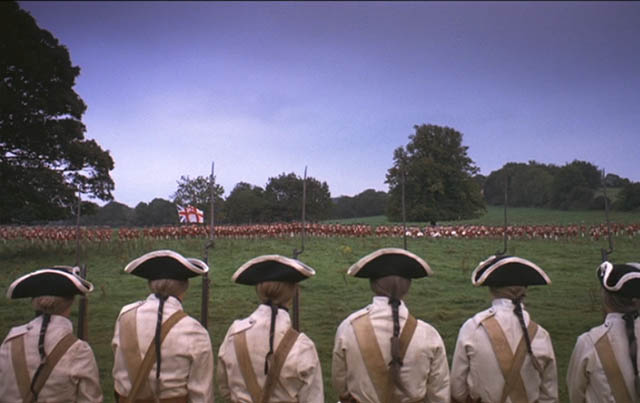
231 The French from the side, aiming their guns. (46:43)
232 Closer shot of French from the side, aiming. (46:44)
233 From behind the French. (46:47 about)
234 From behind Grogan. (46:52)
The command is given to fire.
235 From the side of red coats and Grogan. (46:59)
A number of men fall.
236 From behind the French. (47:06)
237 From the side of the French. (47:13)
238 From the side of the red coats. (47:17)
239 From behind Grogan. (47:20 about)
240 MS of Grogan. He is hit. (47:25)
241 MS Grogan from behind, falling. (47:27)
242 MS of Grogan having fallen, Barry stopping beside him. (47:3)
243 MS from behind of Barry helping Grogan. (47:38)
244 From behind the French. (47:43)
245 From the side of the French. (47:49)
246 Barry helps Grogan to his feet and carries him off the battlefield. (47:53)
 231 |
 232 |
 233 |
 234 |
 235 |
 236 |
 237 |
 238 |
 239 |
 240 |
 241 |
 242 |
 243 |
 244 |
 245 |
 246 |
247 Watery ravine in which two dead men are slumped. (48:03)
Barry enters carrying Grogan.
248 MS of Barry placing Grogan on the ground. (47:20)
CAPTAIN GROGAN: I've only a hundred guineas left to give you, for I lost the rest at cards. Kiss me, me boy, for we'll never meet again.
Barry kisses him. Grogan dies. Barry breaks down in tears.
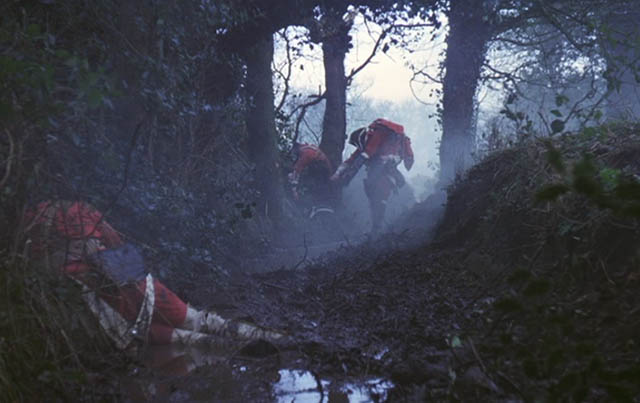

Kubrick's anti-war cinematography is nearly unparalleled in Paths of Glory. But this. This scene. Men ruthlessly marched to their deaths. There's no emotion betrayed as they progress toward their executions, and yet I can think of no more powerful scene than this one that presents the heartless, meaninglessness of these battles, the seeming futility of life born to die in so callous a manner as being marched straight into a bullet, and, what's more, marching straight into the bullet. And what enlightenment might bring escape?
Note how, rather than Barry, Grogan represents the individual. The French are always viewed from behind, en masse, or from the side. The red coats are viewed from the side or behind, but when viewed from behind it is always from behind Grogan as he marches unwaveringly forward. Men are mown down left and right and still Grogan and the others march into the gunfire. As Kubrick films the scene, its likely Grogan's death that saves Barry's life as his effort to help his friend removes him from this senseless and bloody battlefield.
From the book:
It would require a greater philosopher and historian than I am to explain the causes of the famous Seven Years' War in which Europe was engaged; and, indeed, its origin has always appeared to me to be so complicated, and the books written about it so amazingly hard to understand, that I have seldom been much wiser at the end of a chapter than at the beginning, and so shall not trouble my reader with any personal disquisitions concerning the matter. All I know is, that after His Majesty's love of his Hanoverian dominions had rendered him most unpopular in his English kingdom, with Mr. Pitt at the head of the anti-German war-party, all of a sudden, Mr. Pitt becoming Minister, the rest of the empire applauded the war as much as they had hated it before. The victories of Dettingen and Crefeld were in every-body's mouths, and 'the Protestant hero,' as we used to call the godless old Frederick of Prussia, was adored by us as a saint, a very short time after we had been about to make war against him in alliance with the Empress-queen. Now, somehow, we were on Frederick's side: the Empress, the French, the Swedes, and the Russians, were leagued against us; and I remember, when the news of the battle of Lissa came even to our remote quarter of Ireland, we considered it as a triumph for the cause of Protestantism, and illuminated and bonfired, and had a sermon at church, and kept the Prussian king's birthday; on which my uncle would get drunk: as indeed on any other occasion. Most of the low fellows enlisted with myself were, of course, Papists (the English army was filled with such, out of that never-failing country of ours), and these, forsooth, were fighting the battles of Protestantism with Frederick; who was belabouring the Protestant Swedes and the Protestant Saxons, as well as the Russians of the Greek Church, and the Papist troops of the Emperor and the King of France. It was against these latter that the English auxiliaries were employed, and we know that, be the quarrel what it may, an Englishman and a Frenchman are pretty willing to make a fight of it.
As the battle is given in the film, it is a small one, unremembered but for those who fought it. In the book and screenplay it is the famous Battle of Minden, which occurred on August 1, 1759. Prince Ferdinand's army had 2800 casualties, killed and wounded, and the French had 7000.
Read more on this in my post Barry Lyndon and Veit Harlan's The Great King.
It would have been easy for me to have SAID I was present when the orders were brought to Lord George to charge with the cavalry and finish the rout of the Frenchmen, and when he refused to do so, and thereby spoiled the great victory. But the fact is, I was two miles off from the cavalry when his Lordship's fatal hesitation took place, and none of us soldiers of the line knew of what had occurred until we came to talk about the fight over our kettles in the evening, and repose after the labours of a hard-fought day. I saw no one of higher rank that day than my colonel and a couple of orderly officers riding by in the smoke—no one on our side, that is. A poor corporal (as I then had the disgrace of being) is not generally invited into the company of commanders and the great; but, in revenge, I saw, I promise you, some very good company on the FRENCH part, for their regiments of Lorraine and Royal Cravate were charging us all day; and in THAT sort of MELEE high and low are pretty equally received. I hate bragging, but I cannot help saying that I made a very close acquaintance with the colonel of the Cravates; for I drove my bayonet into his body, and finished off a poor little ensign, so young, slender, and small, that a blow from my pigtail would have despatched him, I think, in place of the butt of my musket, with which I clubbed him down. I killed, besides, four more officers and men, and in the poor ensign's pocket found a purse of fourteen louis-d'or, and a silver box of sugar-plums; of which the former present was very agreeable to me. If people would tell their stories of battles in this simple way, I think the cause of truth would not suffer by it. All I know of this famous fight of Minden (except from books) is told here above. The ensign's silver bon-bon box and his purse of gold; the livid face of the poor fellow as he fell; the huzzas of the men of my company as I went out under a smart fire and rifled him; their shouts and curses as we came hand in hand with the Frenchmen,—these are, in truth, not very dignified recollections, and had best be passed over briefly. When my kind friend Fagan was shot, a brother captain, and his very good friend, turned to Lieutenant Rawson and said, 'Fagan's down; Rawson, there's your company.' It was all the epitaph my brave patron got. 'I should have left you a hundred guineas, Redmond,' were his last words to me, 'but for a cursed run of ill luck last night at faro.' And he gave me a faint squeeze of the hand; then, as the word was given to advance, I left him. When we came back to our old ground, which we presently did, he was lying there still; but he was dead. Some of our people had already torn off his epaulets, and, no doubt, had rifled his purse. Such knaves and ruffians do men in war become! It is well for gentlemen to talk of the age of chivalry; but remember the starving brutes whom they lead—men nursed in poverty, entirely ignorant, made to take a pride in deeds of blood—men who can have no amusement but in drunkenness, debauch, and plunder. It is with these shocking instruments that your great warriors and kings have been doing their murderous work in the world; and while, for instance, we are at the present moment admiring the 'Great Frederick,' as we call him, and his philosophy, and his liberality, and his military genius, I, who have served him, and been, as it were, behind the scenes of which that great spectacle is composed, can only look at it with horror.
Except for the anti-war message, Kubrick now diverges in some significant ways from the book and the original screenplay.
The kiss. That kiss. It doesn't occur in the book or in the screenplay.
A kiss to which this one should perhaps be compared is the one that occurs in Room 237 in The Shining. This is a kiss of love and death. Barry would take in Grogan's last breath with it. In The Shining, as Jack kisses the beautiful woman found in the bathroom, he looks into the mirror and sees her transformed into a water-sodden corpse, the erotic transformed into a confrontation with mortality.
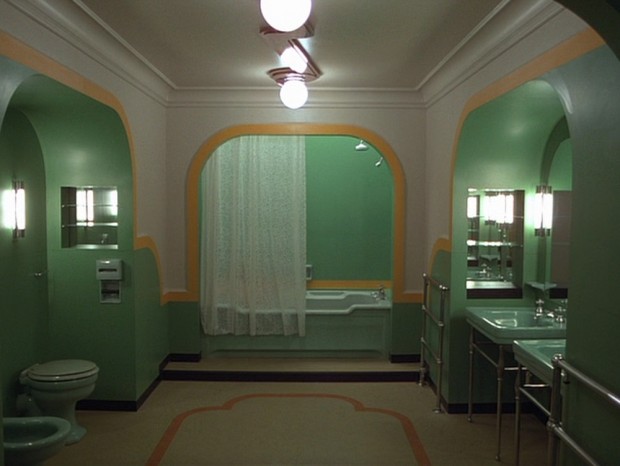
The green bathroom of Room 237.
Kisses don't happen with great frequency in Kubrick's films and they aren't protracted affairs. But they all have meaning in defining relationships. One could say they do in all films, but in some more than others and especially with Kubrick due his sparing use of physical intimacy.
In Killer's Kiss, I believe Davey and Gloria kisse twice--one kiss erotic, while the other was joy of being reunited. Gloria and Vincent kissed twice, the first kiss in his office when he'd pulled her up there to see Davey box, and the second kiss occurring when Gloria was attempting to distract Vincent from Davey, to convince him she wasn't interested in Davey.
There was one kiss between Johnny and Fay in The Killing.
Humbert kissed Charlotte in Lolita when he was attempting to mollify and distract her from her display of Harold's gun when she says she would kill herself if she ever learned he didn't believe in god.
In A Clockwork Orange; Alex gives his mother a brief and awkward kiss when he returns home and finds his room has been leased to another individual.
There are three kisses in The Shining, the traumatic one in Room 237, and before that the awkward kiss Jack gives Danny in the scene where he says he wants to live at the Overlook forever and ever. Wendy kisses Danny when they are reunited after Danny leaves Jack in the maze. Jack and Wendy never kiss.
In Eyes Wide Shut, Alice kisses Helena when they leave for the party. Bill and Alice share an erotic kiss after the party, which Alice examines in the mirror. Bill is kissed by Marion after the death of her father, she overcome with the emotion of his passing. Bill and Domino kiss but are interrupted by Alice. The circle of women pass a kiss, via their masks, at the orgy, and Bill and the Black Feathered Woman kiss via their masks. When Bill returns home from Somerton after his second trip out there, he briefly kills Helena and Alice.
In Barry Lyndon we have the kiss between Barry and Nora, the kiss between Nora and Quin with the announcement of their engagement, the kiss Grogan gives Barry when Barry asks him to be his second at the duel, the kiss Barry gives his mother before he leaves home, the kiss between Barry and Grogan when Grogan dies, a couple of kisses between Barry and the German woman, the kiss between Barry and Lady Lyndon on the terrace, the scene of Barry kissing the other women after Bryan's birth, the kiss between Barry and the nursemaid, the bathtub kiss with Lady Lyndon, the kiss Barry gives the infant Bryan in the same scene where Lord Bullingdon refuses to kiss him, the kiss he gives Bryan when putting him to bed at night, and the kiss Barry gives Bryan when he tells him he's bought him a horse for his birthday. That's a number of kisses in Barry Lyndon. It's to be noted that Lady Lyndon doesn't lavish a single kiss on her children, instead it is Barry in his great affection for Bryan, the defining rupture in the film being Bullingdon's refusal to kiss Barry as he believes it would be a kiss of submission and a betrayal of his biological father.
Kubrick reserved nearly all affectionate and passionate kisses in his films for Barry Lyndon and Eyes Wide Shut.
This kiss is especially dramatic as it was unusual for the time to have a kiss such as this between two men, however platonic, occurring as this father figure breathes his last.
249 MLS of Barry standing before a fire, sleeping soldiers in the background. Return to music of shot 119 of the Sea Maiden, which was playing when Barry first left home. Zoom in. (49:06)
NARRATION: It is well to dream of glorious war in a snug armchair at home. But it is a different thing to see it first hand. And after the death of his friend, Barry's thoughts turned from those of military glory to those of finding a way to escape the service to which he was now tied for another six years.
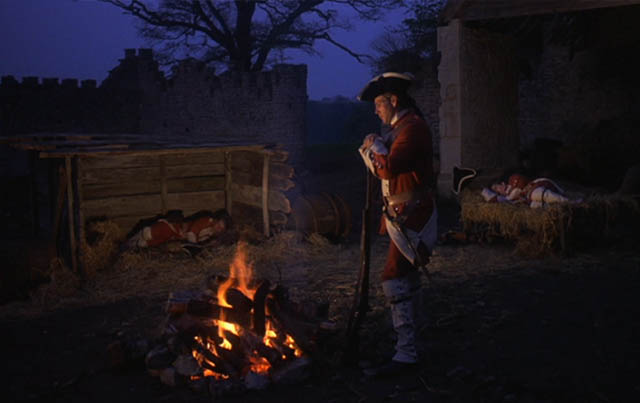
250 A burning home. Soldiers stealing farm animals and goods. (49:35)
NARRATION: Gentlemen may talk of the Age of Chivalry, but remember the ploughmen, poachers and pickpockets whom they lead. It is with these sad instruments that your great warriors and kings have been doing their murderous work in the world.


251 CU of Barry's legs as he ports water pails. (50:14)
NARRATION: A young man could have hardly fallen into worse circumstances than those in which Barry found himself. But fate did not intend he should
remain long an English soldier. And an accident occurred which took him out of the Service
in a rather singular manner.
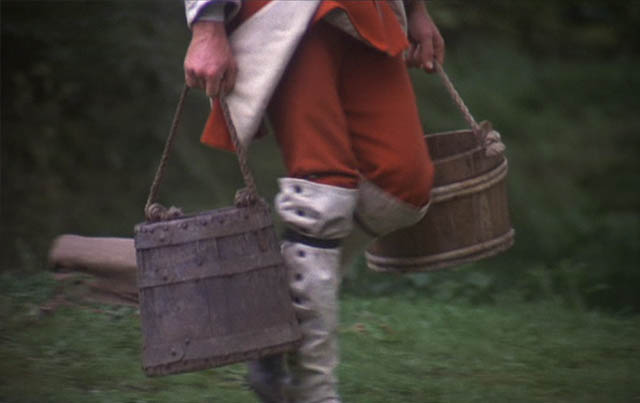
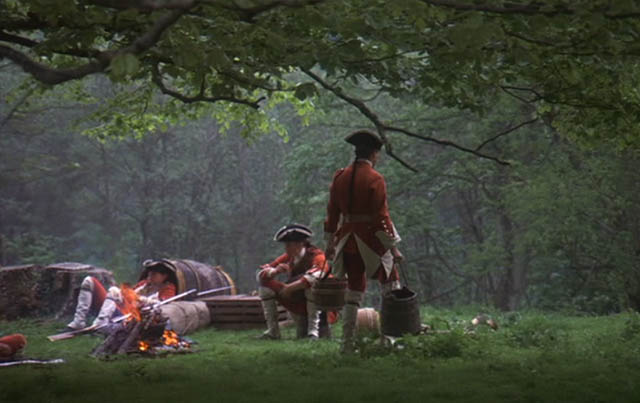
252 LS of Barry carrying the water pails. (50:51)
Barry comes upon two horses and spies two men in the water. Zoom in.
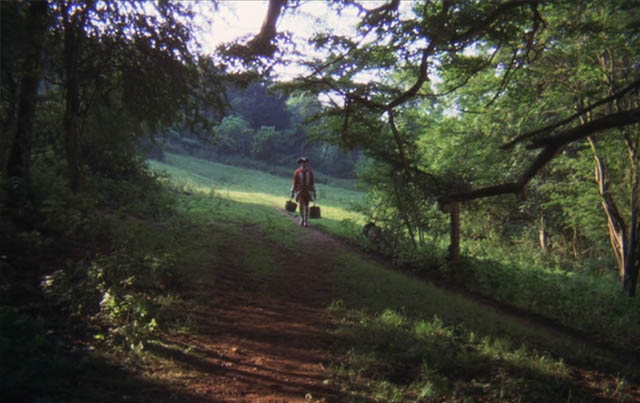
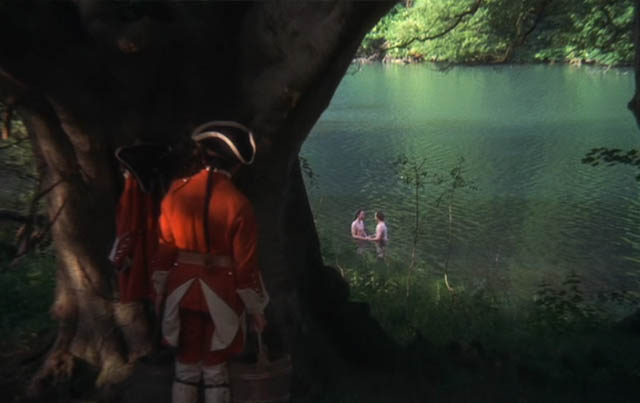
JONATHAN: Freddie, I hope you won't be too angry with me about this but I've got something to tell you which I don't think you're going to be very happy about.
FREDERICK: Oh? What is it?
JONATHAN: Well, first, you've got to promise me that you're going to keep your temper.
Now a very fast and unexpected zoom in on the pair.
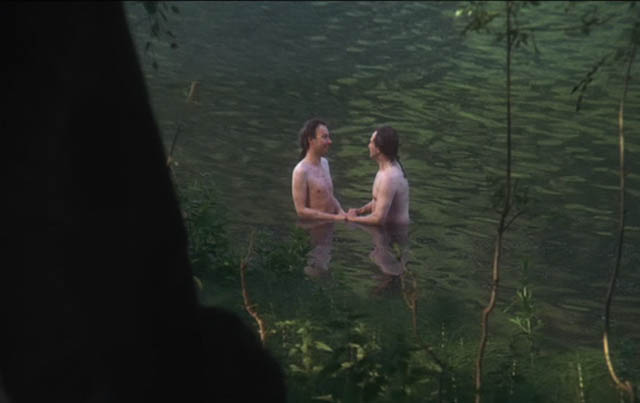
FREDERICK: Jonathan, don't be such a silly ass. You're making a great big mystery about it. Now what on earth is going on?
253 MS Barry listening. (51:36)
JONATHAN: Well, I'm afraid I shall have to go away again. Probably for about a fortnight.
FREDERICK: Oh my god, you're not serious?
JONATHAN: Yes, I'm afraid I am. There's nothing I can do about it.
FREDERICK: Where are you going to this time?
JONATHAN: I'm going to Bremen, carrying important messages and dispatches to Prince Henry.
FREDERICK: But, Jonathon, you promised me the last time it would be once and for all and never again.
JONATHAN: I know. And I promise you I've kept my part of the bargain, but Pontersby insists that I'm the only one on his staff (who can be entrusted with the trip).
NARRATION: Here was an opportunity to escape from the Army for which he had been searching. It was only a few miles through the forest to the area occupied by their Prussian allies, where this Officer's uniform and papers should allow him to travel
without suspicion and to stay ahead of the news of his desertion, which would be sure to follow.

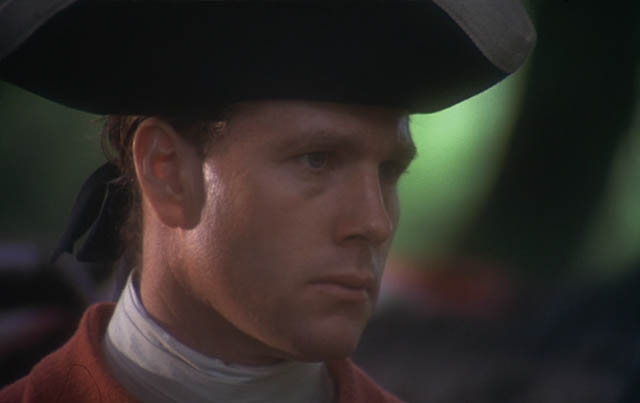
254 LS of Barry walking off with clothing and a horse. (52:31)
JONATHAN: Are you terribly cross with me?
FREDERIC: Damn you, you know I can't stay cross with you for long. Oh, Jonathan, it's times like this I realize how much I care for you, and how impossibly empty life would be
without you.
JONTHAN: Oh, Frederick.

In the book we have:
When we came back to our old ground, which we presently did, he (Grogan/Fagen) was lying there still; but he was dead. Some of our people had already torn off his epaulets, and, no doubt, had rifled his purse. Such knaves and ruffians do men in war become! It is well for gentlemen to talk of the age of chivalry; but remember the starving brutes whom they lead—men nursed in poverty, entirely ignorant, made to take a pride in deeds of blood—men who can have no amusement but in drunkenness, debauch, and plunder. It is with these shocking instruments that your great warriors and kings have been doing their murderous work in the world; and while, for instance, we are at the present moment admiring the 'Great Frederick,' as we call him, and his philosophy, and his liberality, and his military genius, I, who have served him, and been, as it were, behind the scenes of which that great spectacle is composed, can only look at it with horror. What a number of items of human crime, misery, slavery, go to form that sum-total of glory! I can recollect a certain day about three weeks after the battle of Minden, and a farmhouse in which some of us entered; and how the old woman and her daughters served us, trembling, to wine; and how we got drunk over the wine, and the house was in a flame, presently; and woe betide the wretched fellow afterwards who came home to look for his house and his children!
As for how Barry takes on the guise of Fakenham, in an effort to escape the army, this is not at all how it goes in the book, but I will leave that for the next section in which Barry meets Lischen.
As this is not at all how it goes in the book, Barry coming upon the two men in the pond, overhearing their conversation, and walking off with Fakenham's clothes, some consideration needs to be given Barry's eavesdropping on the two homosexual men, especially as we have just had the death scene in which he kisses Grogan.
Homosexuality was still not much approached in most cinematic markets at that time, so it's interesting Kubrick went this direction. He already had in The Killing the suggestion of Marvin, the man who subsidized Johnny's heist, being either a potential lover, or having been a lover and not just a "father" figure as he initially presents himself. With Grogan's death and this scene we have the same elements as found in The Killing. Grogan is certainly a father figure to Barry whose father died when he was a youth. Is Grogan more? I doubt it. But we have the kiss between Grogan and Barry, which would raise some eyebrows in the theater (what are they doing kissing?), and following it we have the episode in which we clearly have two gay lovers. One has disappointed the other with another trip he must take, and I would wonder at the truth of the matter, if Fakenham is the only person who can be trusted with the important message he must deliver. Regardless, during the exchange Barry has the inspiration to steal Fakenham's clothes, but in stealing Fakenham's clothes he is also acquiring his identity. Which he ends up not wearing very successfully as the Prussian officer isn't at all fooled by him.
The way that shot 252 is lit, Barry standing beside the tree, the uniform hanging upon the tree beside him seems almost a mirror reflection, complementing the men in the water, who could be seen as reflective of one another (doubling) and then we have also their reflections in the water itself.

Every time I look at that image of the two men in the water I see the alchemical bath of the king and queen .
I suppose one way to approach this is to consider the complexity of expressions of love, affectionate love, sexual love, in Kubrick's films. In society. It's significant we have this scene occurring immediately after Grogan's death and the narrator's relations of the murderous work of war--which we already know, we have just seen a regiment of men walking right into the abyss, one felled after another, followed by a kiss of love and death between two who have a father/son relationship. Barry had already lost his father, now he has lost Grogan. (He's lost also Nora as well.) He stands staring into a fire, disconsolate. As a soldier, his function in life is to kill, to spread misery among civilians, thieving and setting fire. What attracts me most in the conversation between the two men, as far as what be most meaningful to Barry's eavesdropping ears? "It's times like this I realize how much I care for you, and how impossibly empty life would be without you."
We are hearing and focusing on the plan for escape when there is so much more. The way the men hold hands is the same as when Barry kisses Lady Lyndon on the terrace. There is something in the dynamic and the eavesdropping that takes us back to 2001 and HAL eavesdropping on Frank and Dave by reading their lips. We can then leap forward to Eyes Wide Shut and see here the kiss between Domino and Bill which seems eavesdropped upon by Alice, in some way, as they are interrupted by her call while she watches a film about an adulterer, that interruption provoking Bill to leave and continue his adventure in which he will adopt the disguise of the mask, the mask idea already introduced in Domino's apartment where there were several masks on the walls. The comedy of the men in the water (one of the few comic elements in the film, yes, at the expense of gay men) seems contrapuntal the kiss with Grogan, lightening the film's weight momentarily, but it is also a very serious scene in the way it radiates in all directions as per questions of expressions of affection, love, sexuality--and also in how it interweaves with Kubrick's other films, in particular those scenes where a serious conversation or moment between two is intruded upon by a third. As far as I know the first instance we have of this is in Killer's Kiss, Dave hearing Gloria and Vincent fight, waking up to it. Then The Killing has one eavesdropping scene after another, George eavesdropping on the older couple, Marvin accidentally eavesdropping on Johnny and Fay, Sherry eavesdropping on the men as they plan their heist, Johnny later accidentally eavesdropping when he goes to the wrong door. In Lolita, it is when a neighbor overhears Lolita and Humbert arguing that Lolita flees and plans her escape with Quilty.
Stepping away from the loneliness of Barry, the traumatized Barry, I do think that on one level Kubrick is bringing back in HAL who is able to see from both sides of the chess board, not only his own perspective but Frank's, which is represented somewhat by Barry taking the guise of Fakenham and now crossing the border. But this is also Thackeray's novel, and Barry will end up trapped and not make his escape until that time when he adopts the mask of the Chevalier.
Approx 11,500 words or 23 single-spaced pages. A 88 minute read at 130 words per minute.
Next: Barry Lyndon Analysis - Part 3
Go to Table of Contents for Analysis of Barry Lyndon
Link to the main TOC page for all the analyses